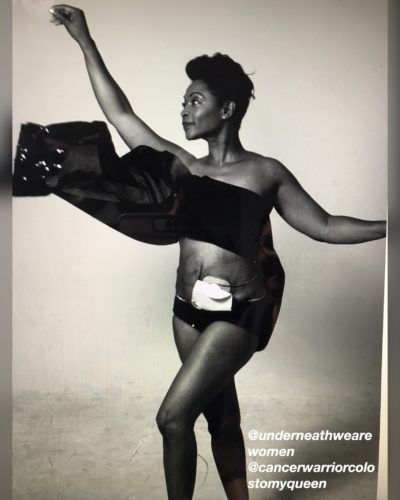
Twenty years after walking away from a successful modeling career, Kimberly Coleman is back on the scene with a powerful story of survival.
Coleman is a vibrant woman full of life and enthusiasm, and has an infectious laugh. Her love for life is evident in the captivating pictures she posts on social media. Her smile warms the heart, and in many of her photos, she flaunts an accessory she wears proudly – her colostomy bag.
Coleman recently returned to the US from Australia, where she traveled to participate in a photo shoot for a special project called Underneath We Are Women, and a fashion show celebrating disability in fashion.
“The Access to Fashion show was showing that disability awareness and representation matters. It was a really incredible show to be part of Melbourne Fashion Week,” Coleman told The Weight She Carries. “It was really awesome.”
I had the privilege of speaking with Coleman soon after she returned home and was blown away by her strength and zeal for life.
Laughter has been one of the instruments she has relied on to get her through her darkest days. Today laughter comes easily. But as a child, pain and trauma were the more dominant emotions.
“I am a person whose life has been about overcoming trauma in many shapes and forms – from being a child that was abused physically, verbally and sexually – and then growing up and looking to transform all that pain into something that is a healthy and happy life.”
– Kimberly Coleman
The physical abuse from her parents began when Coleman was about six years old. When she was around seven years old, her father began to sexually abuse her, she said.
Then at the age of nine, she was raped and sodomized right across the street from her house by three neighborhood kids.
“I still look back and wonder how I made it through those years,” Coleman said. “I know that it was God who preserved me mentally while I was going through all of that physically.”
During those years, Coleman delved into music, comedy and books to cope. She spent hours listening and dancing to her favourite songs in her room.
Coleman’s father continued to abuse her until she was 18. Her mother was aware of the sexual abuse by Coleman’s father but chose to ignore it.
“My mother chose not to address it. I think it was just too difficult. For a long time, I didn’t understand why she didn’t address it, but as an adult, as a mother, I do understand that her mind was probably on the verge of splintering and fracturing at the thought that her husband was violating her child in such a horrendous manner. I don’t agree with her decision, but I give her grace and forgive her for that decision.”
– Kimberly Coleman
When Coleman was 17, she was violated and became pregnant.
At the age of 23, Coleman began working at a bank in the Bay area, and noticed that a young woman in her late teens kept coming into the branch and depositing large amounts of money. Coleman was intrigued.
“She would deposit these huge checks of $10,000 or $20,000 into her account. And I thought, ‘Wow! What do you do?’” Coleman said.
The young woman told Coleman that she was a model and offered to help Coleman get started in the business.
Coleman was reluctant at first because wounds from her past made her think she was undeserving of anything good. After a little persuasion, she decided to give it a try.
“I went in to her agency, which I found out was the top modeling agency in San Francisco, and they rejected me because they said my nose was too wide,” she said.
That day was significant for Coleman because she learned to accept rejection. Instead of allowing that experience to discourage her, she was determined to make it as a model.
“A lot of the young ladies at that time – in the early 90s – were getting nose jobs. I stood by how I looked. I am an African American, this is the nose I was born with, and this is the nose I’m keeping. I was rejected over and over again, but I kept studying my craft and building on this thing that became a passion for me.”
– Kimberly Coleman
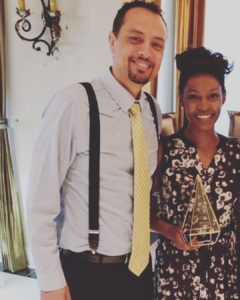
Finally, Coleman found an agency that was willing to represent her and began modeling full time. About six years into her modeling career, the first agency that had rejected her now wanted to represent her.
“The same booker who had rejected me years earlier was still there, and I asked him if he remembered me,” she said. “We laughed about it because, all of a sudden, that look was in.”
Although her career blossomed, Coleman still struggled with scars from her past.
“I think I was drawn to the modeling world because I was looking for validation and affirmation of who I was, and that after so many years of feeling invisible, I was finally being seen,” she said.
Slowly, she began to work on herself in an effort to heal from emotional wounds.
Coleman modeled for close to 15 years and took a break from modeling rather abruptly.
She was auditioning for a job in Los Angeles alongside many well-known models. The job paid somewhere in the neighborhood of $10,000.
Coleman felt intimidated and panicked.
“There was something about that number; something about sitting alongside all these people who had a name. Something about that triggered me. Fear of success got the best of me. It was something that stemmed from my childhood. Many people internalize their pain and we all act it out differently. Mine was self-sabotage.”
– Kimberly Coleman
Coleman, who now had three children, left modeling and got married.
She settled into her new role as a wife and went back to junior college in 2007. She graduated with Collegiate Honors from the University of Houston- Honors College in 2013.
While in college, she did a study abroad in France, joined a sorority and eventually became National Board President of an Asian-Interest Sorority, and competed in the Forensics Speech and Debate team.
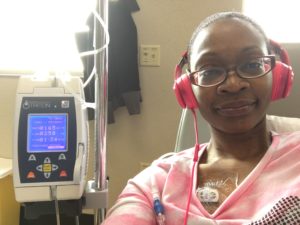
But in 2015, when she was 47, Coleman’s world was turned upside down when her doctor told her she had a tumour in her colon the size of a fist.
It was cancer. And given the size of the tumour, her doctors were surprised she had not obstructed.
“I was heartbroken, and my husband and I cried about it. But we went home, opened a bottle of champagne, and I told myself that I would kick cancer’s butt,” she said.
The work she had done to build up her self-esteem helped her cope with this new reality. Coleman was determined that, even if she didn’t survive, she would go down swinging.
Her doctors devised the best treatment plan for her. It was intense and went on for a year.
“The stage of my cancer was 2A, so I did six weeks of oral chemotherapy coupled with 33 radiation treatments. And what I learned was that cancer is not a physical fight, it’s a mental fight. It’s very humbling. Some days I could barely walk and was bedridden at the end of radiation. So what I used for my outlet during my treatment was writing about my experience on Facebook. I wanted to be transparent, and I wanted to use my transparency for healing.”
– Kimberly Coleman
Coleman had been silent all these years about the abuse during her childhood. But when she thought about the abuse and the cancer, she found a connection.
“I believed it wasn’t coincidence that the cancer I had was in my colon – where I received my first trauma from being sodomized as a kid,” she said.
As Coleman shared her journey as it unfolded, she realized that she was creating a community and a voice for herself and others.
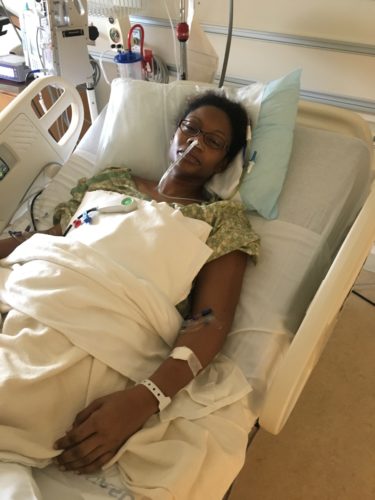
The treatment was difficult on Coleman’s body, and during her first round of chemotherapy, she obstructed and perforated. Fortunately, her children were home with her when this happened, and they were able to get help quickly.
“I almost died and had to get emergency surgery,” she said. “That’s where I got my colostomy.”
Coleman would need to wear a colostomy for two years, her doctors said. Coleman accepted her new reality that day and decided she would own it.
“I recognized that this was life-saving device, so I felt good about it,” she said.
The near-death experience prompted a desire in Coleman to get closure on past pain, and she confront her father about the abuse she had suffered at his hands for so many years.
“I wasn’t talking to either of my parents at that point, but I called my dad, confronted him about what he had done to me, and demanded an apology. He was resistant at first, but I demanded it, which is something I never would have done before with my parents. I had to speak up for that child who didn’t have a protector or a voice at that time. He eventually apologized, and then I went on and spoke to my mother. She passed away a couple months later.”
– Kimberly Coleman
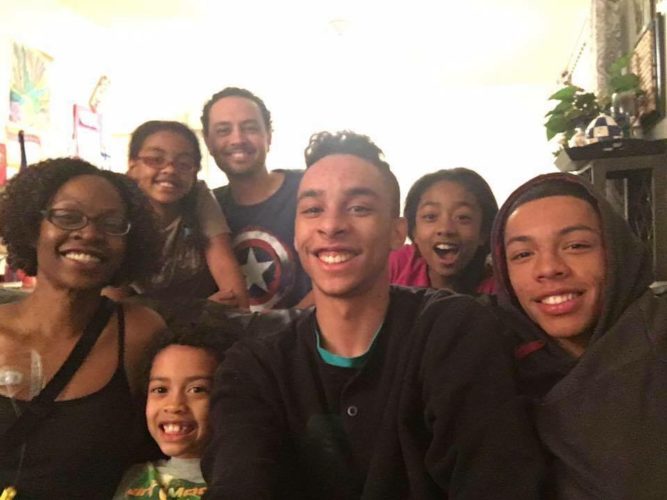
In spite of her circumstances, Coleman always maintained a positive attitude in the midst of her pain. She never stopped dreaming and continued to set goals even when she was bedridden.
“Now I can look back at all of the abuse I went through and see that it shaped me to be a person of empathy; it shaped me to be a person of compassion,” Coleman said.
After her cancer battle, Coleman completed a Rugged Maniac 5k and became a bestselling coauthor of an anthology book entitled “Women of Faith: Their Untold Stories Revealed.”
She is also a motivational speaker, has traveled to three countries and received a 2018 Faith Award for her contributions in both the cancer and colostomy communities.
“I love that scripture that says your latter will be greater than your first. Many days I didn’t think I was going to make it. I was suicidal at the age of nine, and yet here I am…these moments that I am having are pure miracles. That scripture is so true. It’s a matter of hanging on until that comes to fruition. And I’m so thankful that God kept me.”
– Kimberly Coleman
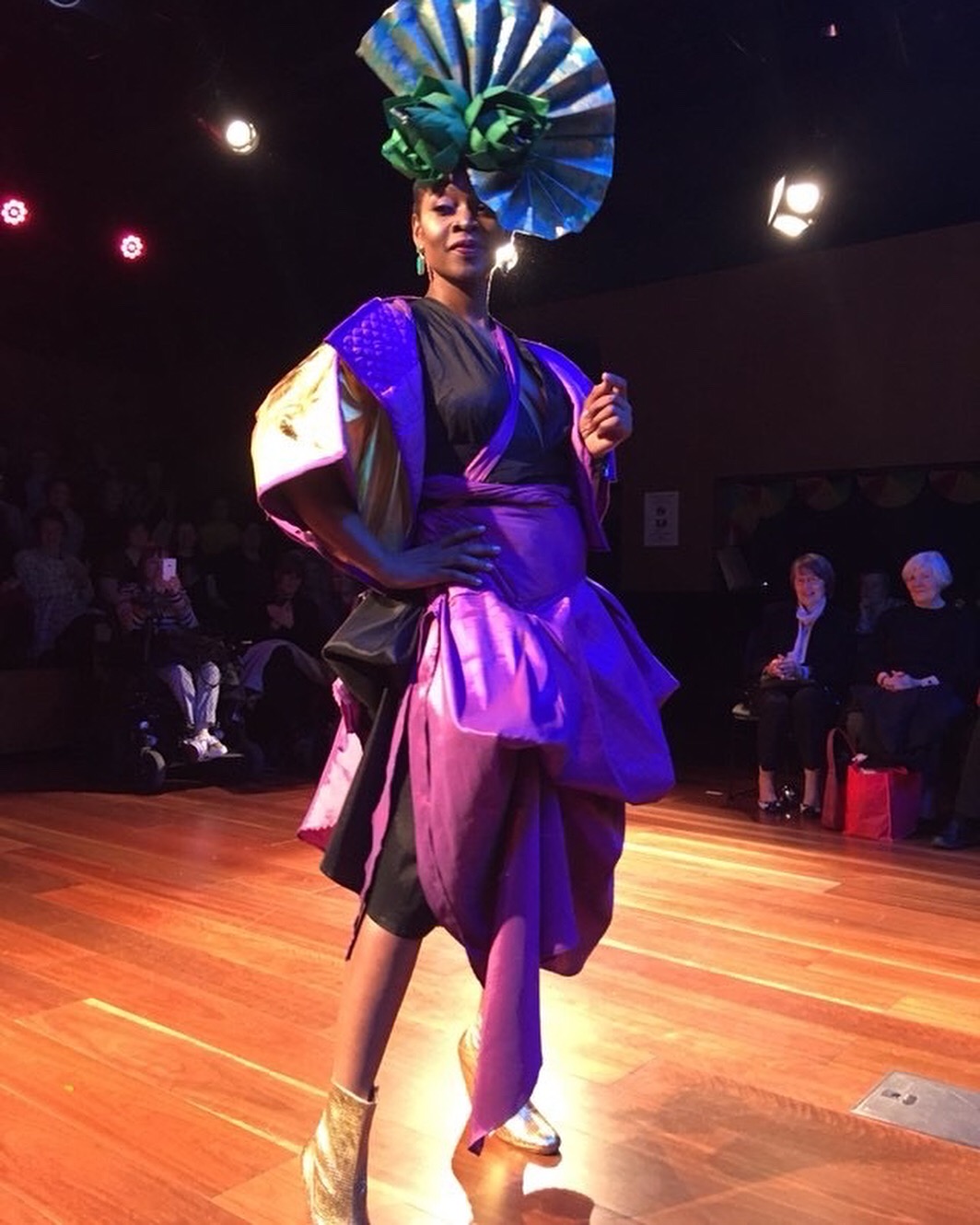
Vimbai E. is a content marketer, ghostwriter, and the founder of The Weight She Carries. With hundreds of articles and stories publishing online, in print and for broadcast, her love of language and storytelling shines through every piece of writing that bears her name.
